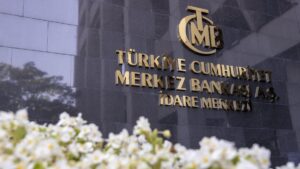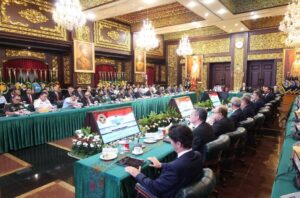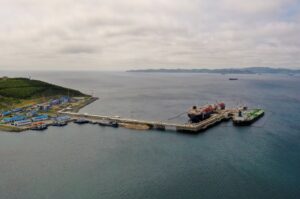Türkiye’s central bank on Tuesday doubled the banks’ daily limit to extend rediscount credits to support exporters’ access to financing, in a move that officials say reflects the government’s determination to prioritize outbound shipments.
The government has been seeking ways to curb the stubborn trade imbalance by lowering dependence on imports and boosting exports.
The Central Bank of the Republic of Türkiye (CBRT) on Tuesday said it lifted banks’ daily limit to extend rediscount credits to TL 3 billion ($111 million) from TL 1.5 billion.
In July, the authority decided to increase the limit for extending these loans to TL 1.5 billion from TL 300 million.
“We have increased the daily credit limit to our exporters by tenfold in a three-month period,” said Treasury and Finance Minister Mehmet Şimşek.
“This shows how serious we are about prioritizing exports,” Şimşek wrote on social media platform X, formerly known as Twitter.
Türkiye needs to make more export-oriented investments for a permanent increase in prosperity, the minister stressed. “By ensuring price stability in the medium term, we will ensure that our companies can access subordinated credit in global markets.”
CBRT Governor Hafize Gaye Erkan echoed Şimşek’s view.
“We prioritize access to financing for our exporters who contribute to the current account balance,” Erkan said in a statement. We will continue to support practices to increase the share of SMEs (small- and medium-sized enterprises) in rediscount loans.”
She emphasized the central bank’s commitment to its roadmap, which includes selective credit tightening measures to expedite the establishment of price stability.
Erkan cited a priority focus on ensuring financial access for exporters contributing to the country’s current account balance during the transition to a lower inflation rate.
“We are diligently implementing our roadmap in conjunction with selective credit tightening measures to achieve price stability as quickly as possible. During the transition to lower inflation, we prioritize facilitating access to finance for exporters who contribute to the current account balance,” she said.
Official data on Monday showed Türkiye’s current account swung back to a deficit in July after a rare surplus a month earlier, propelled mainly by the trade imbalance.
The current account registered a nearly $5.5 billion shortfall versus a revised surplus of $651 million in June. The figure came in higher than market expectations.
The gap for the January-July period reached $42.3 billion, nearly matching the government’s year-end forecast of $42.5 billion that was outlined in the new medium-term program, unveiled last week.
The forecasts in the new economic roadmap see the current account deficit falling to around $34.7 billion, or 3.1% of gross domestic product (GDP), in 2024, down from about 4% projected for this year.
Şimşek earlier said the shortfall is expected to shrink to around $40 billion in December due to a slowdown in consumer loan growth and a sharp rise in tourism revenues.
Data revealed that the 12-month rolling gap surged to $58.5 billion, equivalent to approximately 6% of GDP, according to economists’ calculations.
Türkiye’s foreign trade deficit shrank by 21.2% year-over-year to $8.9 billion in August, according to official data. Exports rose 1.6% to $21.6 billion, the best August level ever, while imports dropped 6.3% to $30.5 billion.
The January-August trade shortfall is still 12.1% higher than a year ago and reached $82.4 billion. Outbound shipments in the eight-month period slipped 0.4% to $164.9 billion. Imports rose 3.5% to $247.3 billion.
The increase in rediscount loan limits should encourage new endeavors by exporters, Trade Minister Ömer Bolat said on Tuesday.
Bolat said ensuring growth in exports is the government’s biggest goal on its path to a lower foreign trade gap and current account deficit.
“Financing support provided to exporters has been increased by tenfold in 1.5 months. We now also expect them (exporters) to make new moves in exports now,” the minister told an event in the Aegean province of Izmir.
The decision will promote increased production and exports without the burden of financing constraints, said Turkish Exporters Assembly Chair Mustafa Gültepe.
Gültepe highlighted that exporters have faced difficulties accessing affordable financing for an extended period. But he said the new economic management has taken significant steps to prioritize access to financing for exporters.
“This starts a process where SMEs receive a larger share of loans, and high-performing exporters are prioritized,” Gültepe said in a statement.
“Increasing rediscount loan limits allows us to overcome a significant hurdle, enabling our exporters to focus more on production and exports without wasting time seeking financing.”




















































Be First to Comment